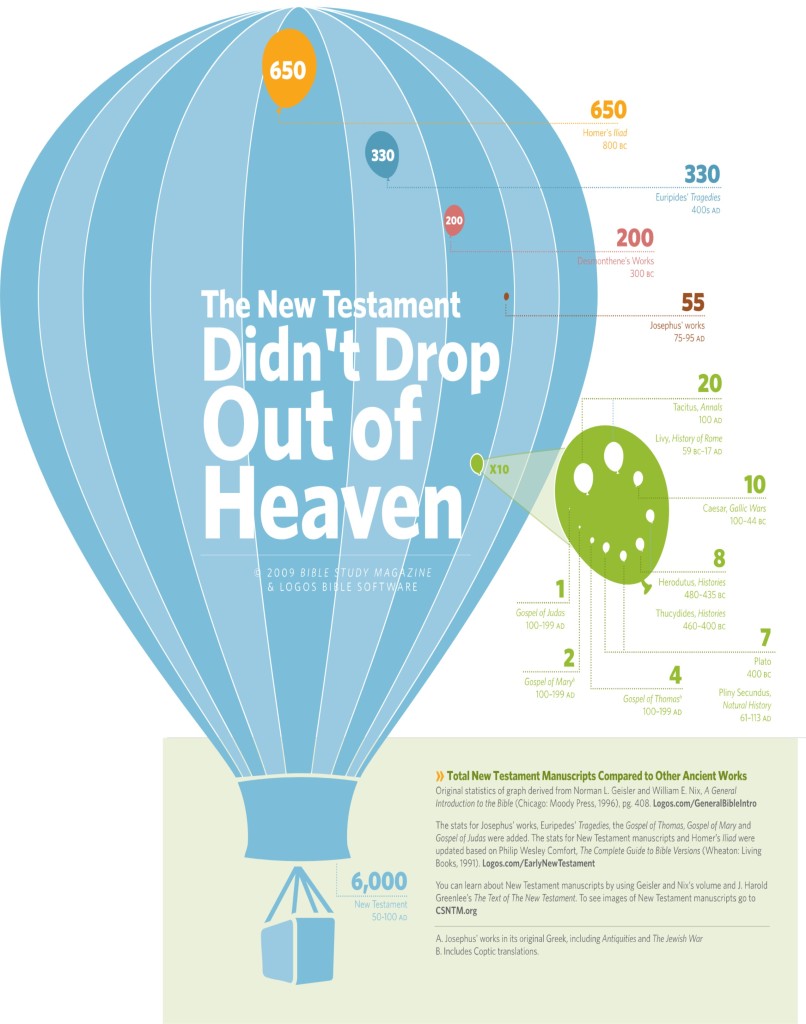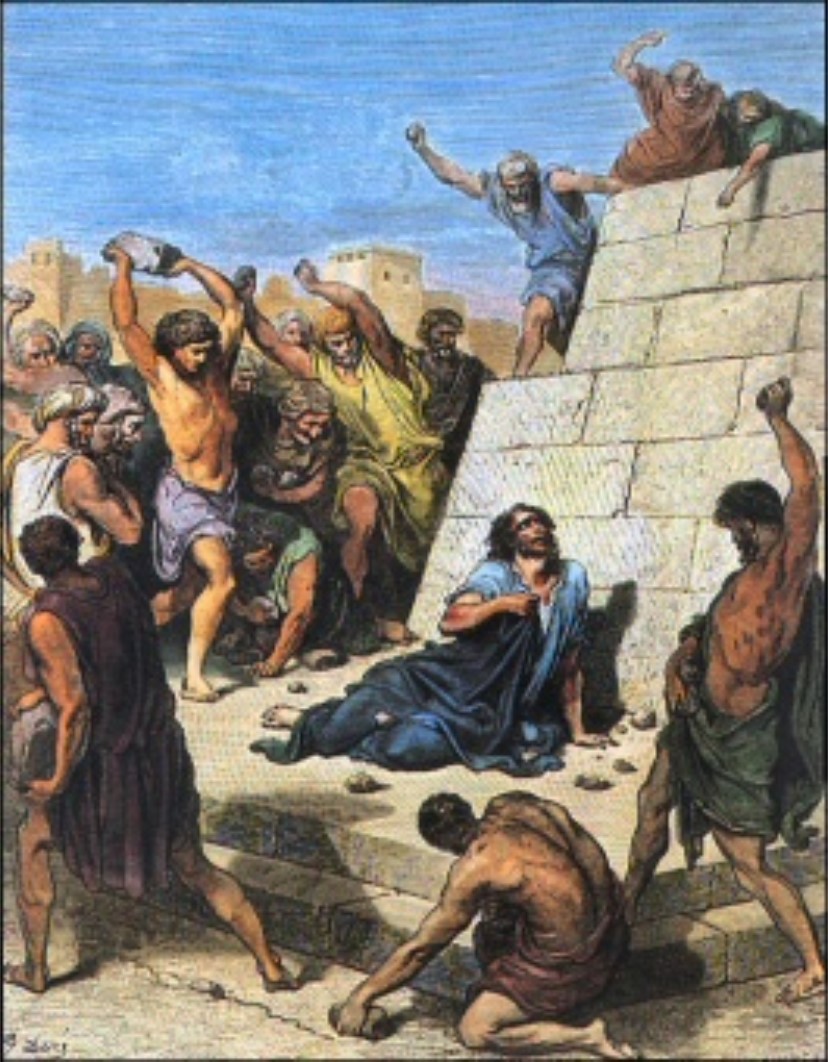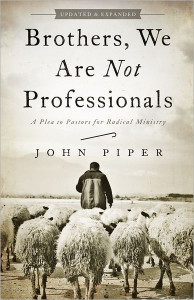As promised, the second entry in a short series about the original languages. For the first entry, see here.
In this entry I’m going to examine a few simple examples for how the original languages can be used to defend the accuracy of the Biblical text. My goal in this entry is to show that with a moderate understanding of the languages, leaders can appropriately keep watch over the flock – and without them, they are inviting false teachers to prey on their church.
As a note, I’d like to remind the reader in a similar fashion to my first post. In no way am I elevating myself as an expert or more learned than most, my only attempt is to humbly suggest the importance of the knowledge of languages, as well as provide answers to my dear friends who have asked me questions about the languages.
Scenario #1: Suzy and the White-Shirted Door Knockers
So you’re a leader of a church. Sunday rolls around, and in walks Suzy and her three children. She calmly walks by the greeters at the door – not looking them in the eye as to avoid attracting attention. She makes a straight line right for you prior to service and says she really needs to talk to you. The conversation goes something like this:
Suzy: All this time you’ve been lying to us. The Bible does not say Jesus is THE God, it says he is just A God. It’s clear from the original text.
You: I see you are troubled, Suzy. Where did you come across this information?
Suzy: We had some visitors this weekend. The Jehovah’s Witnesses came to our house and showed us what the original text in John 1 says. We’ve decided we will be leaving your church to go to their Kingdom Hall down the street.
So, where do we take this conversation from here? One option would be to tell her that’s not how the Bible reads, and it is not how the church has understood it for centuries. However, Suzy feels that she now possesses superior information. Unless you can show her that she doesn’t, she is likely to view that response as narrow-minded and grasping onto tradition rather than the truth.
This example of our neighbors in Mormon and Jehovah’s Witnesses group is actually quite common. In fact, it is likely this will be one of their opening claims should you entertain them when they knock on your door (David Reed has great information on this in this book). Their basis for this claim is that John 1:1 does not contain what is called the definite article before “God”. In English, our definite article is “the”. So, when we say “the boat” we are referring to an actual, singular, definitive boat. In the statement “Johnny walked down to the boat”, the author of this statement would be referring to a specific boat. If the author wanted only to refer to a generic, non-specific boat it would instead be written “Johnny walked down to a boat”. Here is what we find in John 1:1 :
“Ἐν ἀρχῇ ἦν ὁ λόγος, καὶ ὁ λόγος ἦν πρὸς τὸν θεόν, καὶ θεὸς ἦν ὁ λόγος“
The bold segment at the end is the statement in question. The Jehovah’s Witnesses and Mormon’s would claim that we should see the definite article before θεὸς (God), which would read “ὁ θεὸς”. However – this is where our knowledge of the Greek language comes into play. What we see here is an example of what is known as “Colwell’s Canon”. E. C. Colwell completed his research in about 1931, which is where we get this rule. The rule states that nouns prior to the “to be” verb in Greek (here seen as ἦν) will often lack the article and still be definite (Wallace, Greek Grammer Beyond the Basics, 257). Examples of this also occur in John 1: 49, John 8:42, John 19:21, Matthew 27:54 and approximately 250 other times throughout the New Testament.
My suggestion would be that there should be leaders in a church who can properly address a concern like Suzy’s. I’ve heard it said that something like this doesn’t happen very often, so we shouldn’t be that worried about it. Even if it had only happened once in the history of the church, isn’t that enough reason to be prepared for this kind of deception?
Scenario #2: Frankie Freshman and the Know-It-All Professor
It’s late May, and all of the young college students are returning from school to live at home and work their summer jobs as a waiter at the local Ruby Tuesdays. Frankie has returned from his first year in college, and spent the whole year taking his Gen-Ed courses. He tells you of his bow-tie wearing, sport-coat toting young history professor who was able to tell him that nowhere in the four Gospel books does Jesus make an exclusive claim about himself. In fact, in John 14:6 Jesus actually just says “I am a way, a truth and a life”. Combined with all of his new post-modern friends he met, Frankie tells you that he won’t be attending church anymore. The New Testament is a sham, and anyone who believes what the Bible says is clearly uneducated.
Again, this is a simple example but is found all too often – especially in an age where young men and women are easily enamored by what appears to be a new school of thought they’ve never heard before. Just like scenario #1, it is so immensely important that leaders are prepared to address these types of comments. The sad reality is, our young people will follow whoever appears to have more significant knowledge.
In this scenario, I believe it important for our church leaders to be able to show the kind of humble love and understanding someone like Frankie needs, but also be able to show that they are knowledgeable and well-studied, able to defend against these sorts of grievous errors. In a loving way, it should be easy for a leader to walk Frankie through John 14:6, not only showing him the definite article (Eγώ εἰμι ἡ ὁδὸς καὶ ἡ ἀλήθεια καὶ ἡ ζωή) – but also a series of the original manuscripts the book of John comes from.
Scenario #3: “That isn’t in the original Greek.”
It is very easy for myths and rumors to get started. All it takes is the slight twisting of a truth, something that sounds right to the untrained ear, and it takes off like a rocket. In the church, all it takes is one adamant, charismatic false teacher and a whole congregation becomes grossly misinformed. This happens in the form of people telling you something in the English translation doesn’t exist in the original Greek. To fit their deceitful doctrines, false teachers will often make such statements to fit their agenda.
Scenario #4: Charlie Charismatic and the Case of the Missing Implications
The Koine Greek language, like any other, is full of many grammatical rules and constructions that must be learned in order to understand the language. Simply knowing vocabulary and verb paradigms might aid you in getting a translation, but understanding why the text is written the way it is written is incredibly important. One of these rules is the usage of the negative word ‘μὴ’ in a question. μὴ is often easily just translated “not”, or might negate a noun such as “you are not brothers”. In the Koine Greek language, when μὴ is used in a question, it indicates a rhetorical question with an expected negative answer.
In 1 Corinthians 12:29-30, the Apostle Paul says “Are all apostles? Are all prophets? Are all teachers? Do all work miracles? Do all possess gifts of healing? Do all speak with tongues? Do all interpret?” It could be easy for someone like Charlie the overly Charismatic to try and say something like “See! Paul is basically saying don’t all possess these gifts? Clearly we can all have them if we have the faith for it.”
However, with an analysis of the sentence construction we would find the following:
μὴ πάντες ἀπόστολοι; μὴ πάντες προφῆται; μὴ πάντες διδάσκαλοι; μὴ πάντες δυνάμεις; μὴ πάντες χαρίσματα ἔχουσιν ἰαμάτων; μὴ πάντες γλώσσαις λαλοῦσιν; μὴ πάντες διερμηνεύουσιν;
Context could clearly show this, but if Charlie doesn’t listen the original text shows that each question expects a negative response. No, we don’t all possess them – but we are to desire them.
Scenario #5: Common Myths to Bible Translation
I don’t have space to go into myths about Bible translation but Dan Wallace has an excellent list here. It is well worth the read.
—–
This was a lengthy article I know, but I hope many of you found it informative and saw how the original languages can be used to defend against error and deceit in today’s culture.
The next post will be on the importance of the original languages as it pertains to understanding the nuances and deeper meaning behind the text.
Today I had the pleasure of attending the first day of the Gospel Coalition 2013 pre-conference on global missions. This is my first Christian conference of any kind, and I am overwhelmed with the presence of Godly men and women gathered under the name of Christ to praise and grow in our wisdom and knowledge of him.
As the first sentence suggests, the pre-conference is all about our summon and call to global missions as Christians; to bring the gospel to the ends of the Earth as we are commanded by Christ at the end of each Gospel account, most notably Matthew 28:18-20 (The Great Commission).
We heard from three speakers today, DA Carson, Andy Davis, and David Platt. I will briefly highlight some points from each speaker.
DA Carson
Carson preached from 2 Corinthians 4:1-10. The three points he wanted us to take away from this text were:
- Gospel mission demands unqualified integrity.
- The gospel itself is the glory of Christ.
- Gospel ministry is categorized by paradoxical dying to self and life in Christ.
One of my favorite comments by Carson was on verse 6, “For God, who said, “Let light shine out of darkness,” has shone in our hearts to give the light of the knowledge of the glory of God in the face of Jesus Christ.” In regards to this verse, he said “My confidence is not that everyone will be impressed by my knowledge and wisdom, but that again and again God will say ‘Let there be light’ in the hearts of those to whom we preach.”
I also really loved his comment on the question of “Why can’t there be more than one way to God?” In his response, he said that no one has ever asked that question with greater intensity than Jesus himself. As He prayed in the Garden of Gethsemane, sweating drops of blood, Christ pleaded “Can there be no other way!?” The Father said no. There can only be one way – that Christ had to suffer and die, and rise again. And so it is.
Andy Davis
Davis did not preach from any specific text, rather his lecture was on the subject of “What happens to those who die outside of faith in Christ?” Davis made his stance clear from the beginning, he preached an exclusive view because the Bible and more importantly Jesus himself is exclusive. His six points were the following:
- Those without Christ are lost.
- There is no way for sinners apart from the shed blood of Christ.
- There is no salvation apart from conscious faith in Christ.
- This gospel must be proclaimed to the ends of the Earth.
- We are responsible for this Gospel being preached.
- God is sovereign over the entire mission enterprise, guaranteeing it’s success.
In our pluralistic, relativistic, post-modern society, these points and his exposition on them were certainly encouraging. One of my favorite moments of the lecture was telling us of how he wrestled with the question “But what of those who die without hearing the gospel?” He told of a time in his first year as a Christian when he went to a seminar and asked Dr. John MacArthur that very question. MacArthur’s response was something to the effect of “There’s a part of us deep down that wants to say they’ll be OK, isn’t there? The problem is, if we take that stance, then what happens to the people we preach to who reject the gospel? We’ve essentially just damned them by going, which means we shouldn’t go at all. And that goes completely against the urgency and message of the gospel.”
David Platt
David Platt’s lecture was…I don’t even know how to describe it. I didn’t think his message from T4G could be topped, but this one may have done just that. It was incredibly powerful, and I am very grateful to have heard it. Platt followed up Carson’s lecture by continuing in 2 Corinthians 4: 13-18. His three points from this text were:
- As we believe the gospel with deep seeded faith and conviction, lets proclaim the gospel with death defying confidence.
- As we live to extend God’s grace to more people, lets long to exalt God’s glory among all the peoples.
- As we continually envision eternal glory with God, lets joyfully embrace earthly suffering from God.
I could pretty much quote the entire lecture, but here are a couple of my favorite highlights:
- “Why do we take the gospel to hostile nations that resist the message? Because Christ came to us while we were hostile and resistant to him, so it just makes sense.”
- “In the cosmic battle portrayed in 2 Corinthians 4-6 carries out, how can we expect things to be easy?”
- “The western church has turned safety into wisdom, comfort into a God…we are far more in danger from being safe than we are of being reckless.”
—–
I am thankful for the message that was proclaimed today. My desire is to join in prayer with the global church as we pray for the gospel to be proclaimed to all the ends of the earth, to pray for workers to be sent, and ultimately God to be glorified.
As I left the conference tonight, I couldn’t help but feel the messages today were slightly repetitive, and that I really wanted to get some more meat – lets talk strategy on how to make this happen! Then I got back to my hotel – my room with air conditioning, two beds, a flat screen TV, a hot shower – and said to myself “Wow, this hotel really isn’t that nice. I’m glad I’m only here for one night.” After a long day of Christ-exalting, gospel-centered preaching, my heart was still capable of making an idol out of my comfort in one sudden instance.
And that’s when it all hit me – I still need to hear this message over and over again as my heart is changed and my desire to see the gospel proclaimed increases. I still need to wage war daily on dying to myself – am I even ready to talk strategy yet?
Oh God, may my heart yearn for your people throughout the world who have yet to be reached.
For your Friday: Five comparisons between cults and Christianity.
1. A cult will give you a set of rules and things to do to achieve special status or salvation.
Christianity says: “For by grace you have been saved through faith. And this is not your own doing, it is the give of God.” – Ephesians 2:8
There is nothing we can do to achieve right standing before God.
2. A cult will give you a set of requirements you must keep to maintain your status in the group.
Christianity says: “Come to me, all who labor and are heavy laden, and I will give you rest.” – Matthew 11:28
Working to maintain our status or salvation is a false idol that leads to fatigue and a tired soul.
3. A cult will tell you not to associate with those outside of your group who have rejected your message – including your family.
Christianity says: “But I say to you who hear, Love your enemies, do good to those who hate you, bless those who curse you, pray for those who abuse you.” – Luke 6:27-28
Christians must actively engage and love those outside the church.
*Editors note: The point I am communicating here is not that all those outside the church are our enemies. What I am attempting to communicate here is that if we are to love EVEN our enemies, and pray EVEN for those who would seek to abuse us, then certainly we are to love and engage anyone outside the church, enemy or not.
4. A cult will claim special revelation that is only achievable by joining their group.
Christianity says: “When the Spirit of truth comes, he will guide you into all the truth, for he will not speak on his own authority, but whatever he hears he will speak, and he will declare to you the things that are to come.” – John 16:13
The Holy Spirit is given to all who believe, not those who give a certain amount of money or do certain things. Jesus is the Way and the Truth. Anyone who claims special revelation outside of Christ is leading you astray.
5. A cult will deny either the work or deity of Jesus Christ.
Christianity says: “No one who denies the Son has the Father. Whoever confesses the Son has the Father also.” – 1 John 2:23
“But when Christ had offered for all time a single sacrifice for sins, he sat down at the right hand of God…For by a single offering he has perfected for all time those who are being sanctified.” – Hebrews 10:12, 14
Christ is the Son of God, who has made a one-time sacrifice for all sin.
As a young seminary student, one of the first questions my friends ask me is “So, what classes are you taking?” Those who know me well know that I am currently about to go into my third semester of Koine Greek studies. When asked about these classes, I’m often met with one of two responses:
- That is so cool! You must be learning all kinds of new things that you just can’t learn without the Greek text!
- What is that for? Don’t we have the English translations?
I never know how to answer either of these types of responses. In fact, when I first began taking these classes I was a little bit at a loss, as I was unable to explain why they are important. Are the studies of original languages (OL) really that fundamental? Can the church function without it? What about the average lay-person, do they need to know them? Should all pastors be able to reference the OL’s, or is it just meant for the research scholars? In an attempt to be able to provide some answers to my friends and the Church, I am going to spend the next three posts discussing the importance of language studies. The remainder of this post will be spent on the general importance and summons to original language studies. The following posts will deal with defending the accuracy of the text and the truth of the text from error, as well as wrestling with an understanding of the nuances and meaning behind the OL’s.
Before I begin, let me remind the reader that at the time of this post I am only entering my third semester of Greek studies. I have yet to even study the Hebrew alphabet, nor enter the pulpit. By no means am I elevating myself as an expert, nor am I elevating a “two-class” Christianity where those who know the languages are better than those without. I am but a novice, at best. I will however advocate a position stressing the importance of OL studies to pastors and the Church.
Brothers, Bitzer was a Banker
I’ve been reading through John Piper’s book entitled Brothers, We Are Not Professionals. What an amazing blessing this book has been to me at this time in my training. In this text, Piper has a chapter entitled “Brothers, Bitzer was a Banker”. The chapter begins by telling of a book released in 1969 entitled Light on the Path. This text is a daily dose of Scripture readings in both the Hebrew and Greek, and is meant to help pastors preserve and improve their ability to interpret the Bible from the OL’s.
The editor’s name was Heinrich Bitzer. He was a banker.
Piper continues this chapter by asking the question “Must we be admonished by the sheep as to what our responsibility is as shepherds?” He cites several important reasons why pastors should be able to wrestle with the OL’s. I will cite several of these reasons below, either paraphrased or directly quoted from this chapter:
- “First, the confidence of pastors to determine the precise meaning of Biblical texts diminishes. And with the confidence to interpret rigorously goes the confidence to preach powerfully.”
- Having to depend on the various (differing) English translations tends to discourage careful textual analysis in sermon preparation. As soon as you really start paying attention to tenses, conjunctions and vocabulary the versions are too diverse to provide a sure analysis. So the preacher often contents himself with the general focus or flavor of the text, and his exposition lacks the precision and clarity which excite a congregation with the Word of God. Boring generalities curse many pulpits.
- For example, most of the modern English translations (RSV, NIV, NASB, NLT) do not enable the expositor to see that “have fruit” in Romans 6:22 links with “bear fruit” five verses later in Romans 7:4. They all translate Romans 6:22 without the word fruit.
- “So what we find in groups where Greek and Hebrew are not cherished and pursued and promoted is that expository preaching—which devotes a good bit of the sermon to explaining the meaning of the text—is not much esteemed by the preachers or taught in the seminaries.”
- “Weakness in Greek and Hebrew also gives rise to exegetical imprecision and carelessness. And exegetical imprecision is the mother of liberal theology.”
- “Where pastors can no longer articulate and defend doctrine by a reasonable and careful appeal to the original meaning of Biblical texts, they will tend to become close-minded traditionalists who clutch their inherited ideas, or open-ended pluralists who don’t put much stock in doctrinal formulations. In both cases the succeeding generations will be theologically impoverished and susceptible to error.”
I can think of no better way to end this section than with Piper’s closing words to his chapter:
Let’s give heed to the word of Martin Luther: “As dear as the gospel is to us all, let us as hard contend with its language.” Bitzer did. And Bitzer was a banker!
The Lowest Common Denominator
If we took a survey of the Church today (specifically the American Church), I would contend that we would find more churches without pastors trained in the languages than those with. For that matter, how many seminaries are still requiring the OL’s? Of those that do, how many require anything more than one semester?
I’ve spoken to many leaders who are ten or more years out of Seminary, and they’ve all but forgotten their OL training. Many I’ve spoken to will say something along the lines of “I have a concordance and Bible software now; it does all the work for me.” Friends, I fear this is similar to walking onto a football field with all of the equipment yet not knowing the rules of the game. Having the tools at our disposal is an important start, but we must know how to play the game!
Many critics will argue that languages are best left to the experts. After all, quite a bit of work is necessary to go from a student who knows the vocabulary, to a scholar who works for translation boards. And this is true. But is there not room in the middle for our pastors to have a working knowledge of the texts from which they preach each week? As Piper also questions in his book, “We have, by and large, lost the Biblical vision of a pastor as one who is mighty in the Scriptures, apt to teach, competent to confute opponents, and able to penetrate to the unity of the whole counsel of God. Is it healthy or biblical for the church to cultivate an eldership of pastors (weak in the Word) and an eldership of professors (strong in the Word)?” When we “leave the work to the experts”, we have essentially separated and professionalized the work of the shepherd into a completely separate role.
One of my favorite artists and poets Propaganda raps in one of his songs: “…See the presence of good art will unconsciously refine a community, and poor art will do an incalculable harm…” I believe this same concept can be applied to our teaching philosophies inside (and outside) the Church. The presence of educated, expository preaching and teaching will unconsciously refine and build up our church communities. Without it, we are stuck teaching to the lowest common denominator, and this will do an incalculable harm. We are already seeing the effects of this, as preachers uneducated in the Word of God are taking the pulpit and preaching all kinds of wishy-washy doctrines, swaying to and fro with lofty opinions and flat out damning interpretations of the text.
If we want to see our Church maintain solid preaching and teaching, we must not neglect the study of the OL’s.
Give them the Bread, not the Bread Factory
It is the responsibility of every preacher in the pulpits to teach the whole counsel of God. James tells us that not many of us should strive to become teachers, as we will be judged more severely (James 3:1). How then can we preach the whole counsel of God and teach to the level at which we are demanded if we cannot understand the languages in which the Word was written? When we are unable to read through the original languages ourselves, we become enslaved to the commentaries. Unable to work through these things on our own, we can but only trust what other people have said on these matters. The Prince of Preachers CH Spurgeon has this to say:
“A man to comment well should be able to read the Bible in the original. Every minister should aim at a tolerable proficiency both in the Hebrew and the Greek. These two languages will give him a library at a small expense, an inexhaustible thesaurus, a mine of spiritual wealth. Really, the effort of acquiring a language is not so prodigious that brethren of moderate abilities should so frequently shrink from the attempt. A minister ought to attain enough of these tongues to be at least able to make out a passage by the aid of a lexicon, so as to be sure that he is not misinterpreting the Spirit of God in his discoursings, but is, as nearly as he can judge, giving forth what the Lord intended to reveal by the language employed. “
Truly, it is the job of the preacher to deliver the bread, not the bread factory. We need not all be scholars, but should we not have the capability to understand the particulars of the language and why certain tenses or constructions are used – and thus its importance on the message?
—–
I know most of you were probably hoping to see some language examples. I am saving those for the other two posts. However, I hope we can all begin to see the importance of the continual study of the OL’s to pastors and the church. For those of us in the Western Church, we have so many resources readily available to assist us in this. To neglect the resources and funding we have at our disposal that much of the global church does not have is simply irresponsible. This is not something that can continue to go neglected in our seminaries and churches today.
What does this mean for us now? Pastors, if you find your OL skills lacking let this be an encouragement for you to refresh your skills. Consider signing up to audit the language courses at your local school, picking up Light on the Path or breaking out your old primers and start working through them. Students, do not neglect your studies thinking the software and commentaries will do all of the work for you. Continue to strengthen your skills and exegesis while you can.
Lay-persons, you may be asking what this all has to do with you. Let me also encourage you that you need not sit this one out. There are plenty of resources out there for you to be able to work through. Consider picking up a key word study bible or an interlinear text (one where the English and OL are next to each other), a concordance, or a copy of something like Logos Bible Study software. Ask your pastors to lead a Bible study workshop at your church. Being able to pick up on small nuances, such as knowing that what many translations render as “servant of Christ” could actually be rendered “slave” (coming from the word δοῦλός) can provide immediate depth and richness to your studies.
Let us encourage and exhort one another to a deeper study of God’s Word all for the glory of the King on the throne!






